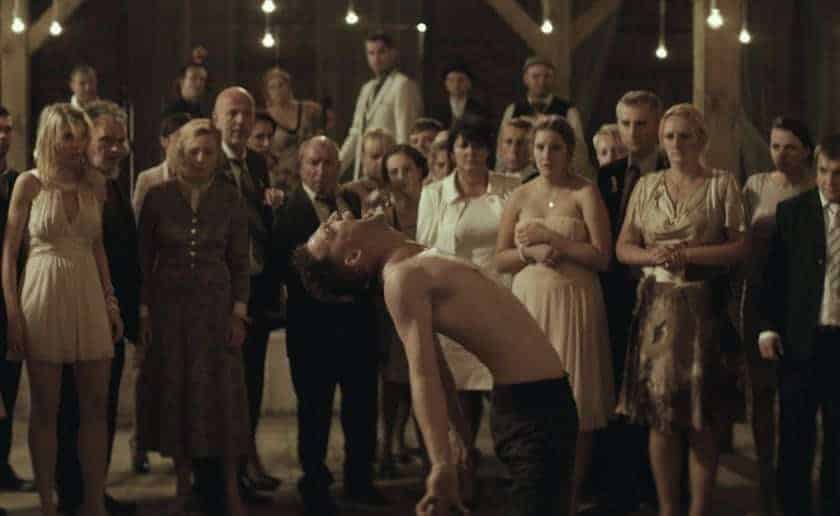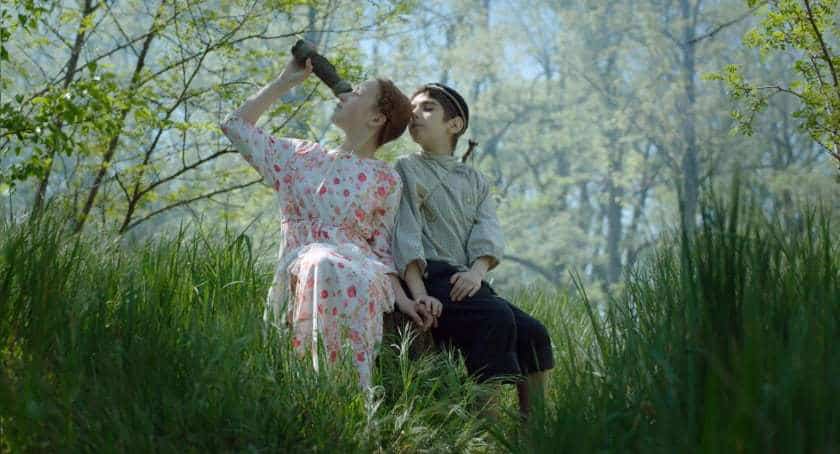
There’s a troubling absence in Marcin Wrona’s Demon: there are very few Jews in this adaptation of a Jewish story. Protagonist Piotr (Itay Tiran) is a gentile, his intended bride (Agnieszka Zulewska) is a gentile, and all the people in their nameless Polish town are gentiles, too. There are only two Jews in the entire film: a wedding guest and a ghost. What happened to the Jewish population of this town? And why does nobody want to talk about whether a Jewish girl’s bones might lie buried beneath a family farm?
Demon adapts the plot structure of Piotr Rowicki’s 2008 play Clinging while borrowing motifs from the Jewish classic that inspired Rowicki. As in Clinging, a newcomer to a small Polish town unearths bones on his land, causing him to become possessed by a dybbuk — a restless spirit of Jewish folklore that inhabits a living person to carry out a goal — of a Jewish girl killed in the 1940s.
While Clinging focused more closely on the scars left by Poland’s treatment of its Jewish population during the Second World War, Demon incorporates the ghostly love story plot from S. Ansky’s classic 1913 play The Dybbuk, or Between Two Worlds. In Ansky’s tale, a young Jewish bride is possessed by the dybbuk of the man she loved but was prevented from marrying, so that they can be together forever. In Demon, a young Jewish bride becomes a dybbuk to possess the bridegroom she was promised before her life was cruelly and mysteriously cut short.
We open in the middle of small-town Poland. An excavator rolls through dusty and deserted streets. Whether or not the houses it passes are inhabited, they feel empty. But change is coming in the form of bridegroom Piotr, a Londoner of Polish descent who moves to this backwater, with nothing but his Range Rover, to marry local girl Żaneta. Then Piotr uncovers a skeleton buried on an old family farm that was given to the couple for their new home. The wedding celebrations get complicated when the groom is possessed by the dybbuk of a young woman who believes that Piotr is her intended husband.

Piotr’s possession starts with discomfort in his body. He scrubs invisible smudges from his lip, stares perplexedly at his hands, and kneads at his face with his knuckles. This culminates in a chilling, back-bending episode where a fully-committed Tiran claws off his shirt as though trying to remove his own skin. (“He just has a touch of food poisoning!” Piotr’s sweating father-in-law insists.) The groom’s malady is only pinned down when he starts speaking in high-pitched Yiddish. It takes the lone Jew at the wedding, a slightly dotty old professor, to identify the voice issuing from Piotr’s lips as that of Hana: a beautiful Jewish girl the Professor knew in his youth who disappeared on the eve of her wedding.
This town is haunted by more than Hana’s single ghostly presence. An uneasy air creeps into everyone, spreading outward from the possessed groom. The wedding slides into a strange bacchanalia where, amidst the revelry, ugliness bubbles to the surface. The film cuts to low-voiced conversations between nameless wedding guests: “In the old days, everyone was Polish… And then the bad ghosts came and divided all the Poles. And then they took Germany, Russia, and finally Israel!”

Though the ghost story centres around Piotr, the burden settles on his bride Żaneta. Zulewska delivers a wrenching performance as a woman terrified for the man she loves and increasingly horrified by the people around her. By literally digging up the dead past, Piotr exposes something that other characters are desperate to keep hidden from his bride. Nevertheless, Żaneta strides out into the rain to dig, searching for the bones Piotr saw. Seeing this, another character mistakes Żaneta for the ghost-bride herself.
Demon skips from climax to credits without much in the way of denouement. It feels abrupt, like treading on a step that isn’t there. Though the film drops hints about what happened to Hana, it never provides anything concrete: whispers, too-fervent denials, and cryptic drunken allusions are all the clues we get. Demon ends with a callback to the final moments of The Shining: an old photograph of Piotr that, temporally speaking, shouldn’t be possible. On its own, the callback would be cute, but as merely the last of the film’s unresolved mysteries, it’s frustrating.
In Ansky’s play, a group of holy men eventually banish the dybbuk, but in Demon the Professor makes a point of observing where the Synagogue used to stand, and that it is a butcher’s shop now. Unable to exorcise the ghosts of history, Żaneta’s father urges everyone to do the next best thing: forget. It was all a hallucination, a fever dream. This never happened. Let it disappear.

